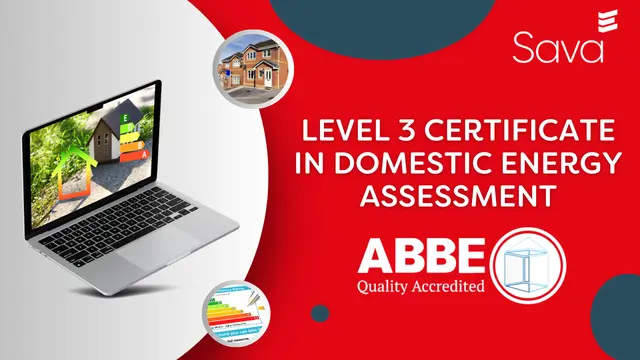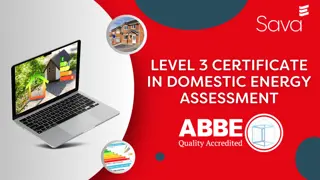
ABBE Level 3 Certificate in Domestic Energy Assessment
A fully online qualification for those looking to understand and produce EPCs
SAVA
Summary
ELCAS funding available for military leavers. Contact ELCAS for details.
- Level 3 Certificate in Domestic Energy Assessment - Free
Add to basket or enquire
Overview
The ABBE Level 3 Certificate in Domestic Energy Assessment is an industry recognised qualification for those looking to understand, interpret and complete Energy Performance Certificates (EPCs) on residential dwellings.
Our Domestic Energy Assessor (DEA) training is delivered through an online learning platform, giving you flexibility as to where and when you undertake the learning for this qualification. You can enrol on the course at any time and work through the content at your own pace.
Qualification
ABBE Level 3 Certificate in Domestic Energy Assessment
Description
Key Features
- Our DEA training gives you the skills required to assess buildings and produce accurate Energy Performance Certificates (EPCs) for domestic dwellings
- Includes comprehensive DEA training material that leads to you completing your own assessment portfolio
- Use of RdSAP software whilst in training included at no extra cost
- Sava has trained 1000s of DEAs over the last 16 years. We were responsible for introducing the first energy rating 40 years ago and have a deep heritage in energy ratings, having helped to develop Energy Performance Certificates which became law in 2007 – so you’re in good hands
- This DEA training is delivered entirely online giving you full control over your learning so you can study at a time and pace that suits you
- The qualification is accredited by the Awarding Body for the Built Environment (ABBE), so you can be confident that the learning you receive is of the highest quality
- Includes additional optional content covering the differences in the RdSAP methodology for Domestic Energy Assessors wishing to lodge EPCs in Scotland.
Modules
- Introduction – induction, introduction to EPCs, schemes, audits, legal matters and dealing with customers
- The survey – health & safety, assessing the property and data collection for an EPC
- Property features – the features of a property that affect the EPC rating and how it is assessed in RdSAP (i.e., property age and size, insulation, windows, flats, lighting etc.)
- Construction – different construction types of walls, floors and roofs, and how to gather the right data for the EPC
- Space and water heating – about different main heating systems, hot water, secondary heating, and fuel sources for the purpose of RdSAP
- Renewable technologies – identifying renewable technologies and how to assess them for the EPC
- Recommendations – what the recommendations are, and what set of circumstances will make them appear as an improvement measure on the EPC.
DEA training assessment requirements
The assessment for this DEA qualification focuses on producing 5 case studies which are submitted through an e-portfolio.
Who is this course for?
- The DEA course is suitable for those considering a career change. No prior experience is necessary
- Ideal for those who need to provide or understand and interpret EPCs as part of their daily duties
- The course is also designed for people with prior knowledge or experience of buildings, for example estate agents, builders, surveyors, heating engineers, architects, landlords etc.
- This course is ideal for adding domestic energy assessments as a new product or income stream to your existing services.
Requirements
There are no formal entry requirements. Anyone over the age of 18 can undertake this DEA training. The cost of the course includes all online training materials, ABBE registration fees, assessment and the award of the ABBE Level 3 Certificate in Domestic Energy Assessment.
Career path
Once complete, this Certificate qualifies you to understand, interpret and produce EPCs. This skill is sought-after in the housing industry, with some Domestic Energy Assessors working independently or for organisations such as housing providers.
Questions and answers
Certificates
Level 3 Certificate in Domestic Energy Assessment
Digital certificate - Included
Certificate will be requested from ABBE on your behalf and will be sent to you on completion of the course.
Reviews
Currently there are no reviews for this course. Be the first to leave a review.
Legal information
This course is advertised on reed.co.uk by the Course Provider, whose terms and conditions apply. Purchases are made directly from the Course Provider, and as such, content and materials are supplied by the Course Provider directly. Reed is acting as agent and not reseller in relation to this course. Reed's only responsibility is to facilitate your payment for the course. It is your responsibility to review and agree to the Course Provider's terms and conditions and satisfy yourself as to the suitability of the course you intend to purchase. Reed will not have any responsibility for the content of the course and/or associated materials.


